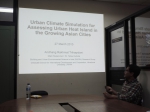ITB Students Won Second Place in Nationals with "Rusun Reswara" Urban Design
By Adi Permana
Editor Adi Permana

BANDUNG, itb.ac.id— Eight ITB students majoring in Architecture and URP (Urban and Regional Planning) won second place in the Village Development Planning Competition, which was organized by the Planning Specialist Association of DKI Jakarta.
The students that formed the M10 team are Haykal Hielmi (Architecture, 2018), George Michael (Architecture, 2018), Dhiya Ilham T. (URP, 2018), R. Putera Bagus W. (URP, 2018), M. Alif Alwinutama (URP, 2018), Frida Caturima (URP, 2018), Fakhriah Qurratu A.H. (URP, 2018), and Frida Nathania (URP, 2018).
Assigned to RW 009, Rawa Badak Selatan, Koja, Jakarta Utara as their study area, the team came up with the construction of flats called "Rusun Reswara" as their solution to the village development issue.
With the concept of healthy, resilient, and self-sufficient living spaces, the team performed an analysis of the design's socio-economic and infrastructural factors. They also prepared the program's socio-economic proposal, site plan, masterplan of surrounding illustration, mapping scheme, planning map, short paper, poster, 3D-model of the scheme, and a demonstration video for a month.
The team’s representative, Frida, initially registered for this competition because she wished to partake in events outside the university’s practical work or internships. Moreover, its theme is related to URP's third-year course subjects. Another motivation for the team to join the competition is its grand prize of cash and internship opportunities at the Provincial Government of DKI Jakarta.

Frida reminisced that there had been numerous obstacles throughout the competition, especially during the team-building process. Dhiya Ilham, the team leader, felt that the team needed to utilize the potential of its members to work together fully.
The team, which consisted of six URP and two architecture students, is a collective effort between the field of URP and architectural design to achieve the most holistic and optimal outcomes.
“The key is collaboration. If we only rely on students from the same major (URP), the team will lack other perspectives. We will end up focusing too much on regional planning instead of the design,” Putra added.
The team also faced another problem--the schedule of each member. Determining the right time to discuss their progress was difficult since each had their personal viewpoints on the result. Moreover, the COVID-19 pandemic complicates the survey for collecting data in RW 009, Rawa Badak Selatan.
Likewise, health condition was a challenge for the team. Nonetheless, the team conquered all these hardships with their enthusiasm, knowledge, and solidarity in mutual understanding.
“Supporting each other is really important. Just a simple compliment and appreciation would be worthwhile towards others,” Frida affirmed.
This competition is both a challenge and an opportunity to prove themselves as participants. They were presented with factual conditions that expect holistic thinking skills in their problem-solving strategy. Furthermore, the team admitted that their respective abilities are enhanced through the formulation and execution of the project.
Designing a village does not only manage its physical aspects like its building layout and supporting infrastructure addition. It also takes care of non-physical factors such as the RW 009 residents in Rawa Badak Selatan who were involved in the Rusun Reswara planning program.
“This competition is not only about the planning, but also how we position ourselves as people living there. We can understand their living conditions and socially contribute through our solution,” Frida stated regarding her thoughts about the competition. A more complete commentary of the team's proposed output can be viewed in this video.
Reporter: Mirmanti Cinahya Winursita (Perencanaan Wilayah dan Kota, 2019)
Translator: Ruth Nathania (Teknik Lingkungan, 2019)

.jpg)
.jpg)
.jpg)
.jpg)
.jpg)
.jpg)

